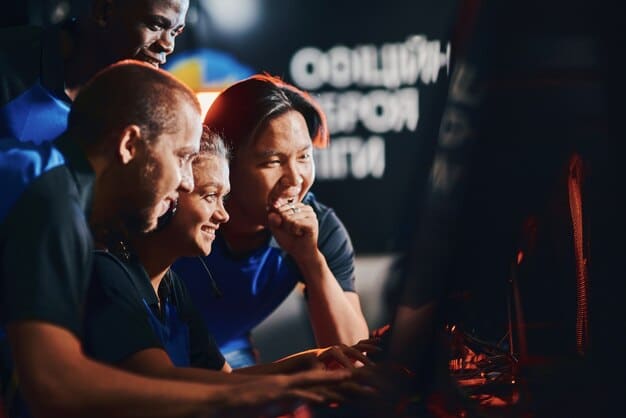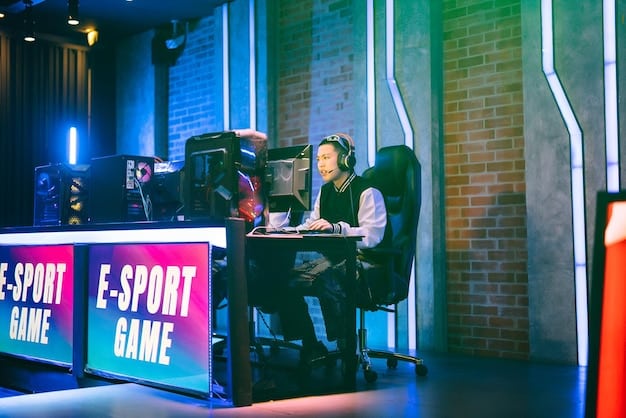Collegiate Esports Scholarships in the US: A 2025 Game Changer

Collegiate esports in the US are undergoing a significant transformation due to the increasing availability of scholarships, creating new opportunities for student-athletes and reshaping the landscape of competitive gaming within higher education by 2025.
The rise of collegiate esports in the US: How New Scholarships are Changing the Game in 2025 is transforming competitive gaming within university systems. Offering opportunities for dedicated student-athletes to get financial assistance while competing in organized gaming, this reflects esports’ growing mainstream integration.
The Evolution of Collegiate Esports
Collegiate esports programs have grown exponentially in recent years, evolving from casual gaming clubs to structured athletic programs with coaches, dedicated facilities, and scholarship opportunities. This evolution marks a significant shift in how universities perceive and support competitive gaming.
From Clubs to Varsity Teams
Initially, esports found its footing in colleges as student-run clubs, organizing local tournaments and fostering communities of gamers. Over time, recognizing the growing popularity and potential of esports, universities began to formalize these clubs into varsity-level teams, providing resources such as coaching staff, training facilities, and official recognition.
The Role of Organizations like NACE
Organizations such as the National Association of Collegiate Esports (NACE) have played a pivotal role in standardizing collegiate esports. NACE establishes guidelines for competition, eligibility, and scholarship programs, helping to legitimize esports within the collegiate framework. Their efforts have contributed to the increased acceptance and support of esports by universities across the US.
- Standardizing rules and regulations for collegiate esports.
- Providing a platform for intercollegiate competition and recognition.
- Advocating for the integration of esports into university athletic programs.
- Offering resources and support for universities looking to develop esports programs.

The journey of collegiate esports from simple gaming clubs to recognized varsity sports isn’t just about fun; it’s about the potential to earn respect and assistance, showcasing how far the sport’s popularity has grown.
The Rise of Esports Scholarships
The introduction of esports scholarships represents a pivotal moment for collegiate esports, providing financial support and recognition to talented student-athletes. These scholarships not only attract top-tier gamers to universities but also validate esports as a legitimate athletic pursuit.
Financial Incentives for Gamers
Esports scholarships provide financial incentives to attract talented gamers who might otherwise pursue other academic or athletic opportunities. These scholarships can cover tuition, room, board, and other educational expenses, making higher education more accessible to aspiring esports athletes.
Attracting Top Talent to Universities
Universities offering esports scholarships are able to attract top talent from around the country and even internationally. This influx of skilled players elevates the level of competition within collegiate esports and enhances the reputation of the university’s program.
- Increased competitiveness in collegiate esports tournaments.
- Enhanced recruitment opportunities for university esports programs.
- Improved visibility and recognition for participating universities.
- Greater opportunities for student-athletes to pursue their passion for gaming while earning a degree.
These financial incentives not only legitimize the athlete’s athletic prowess but also draw more talent to particular colleges, increasing the team’s average skill and giving the school greater prominence inside the esports community.
Impact on Student-Athletes
Esports scholarships have a profound impact on student-athletes, providing them with the resources and support they need to succeed academically and athletically. This support can lead to improved academic performance, enhanced personal development, and greater career opportunities.
Balancing Academics and Athletics
Esports scholarships enable student-athletes to balance their academic pursuits with their athletic commitments. By providing financial support and structured training programs, universities help students manage their time effectively and excel in both areas.
Improved Academic Performance
Studies have shown that student-athletes who participate in esports programs often exhibit improved academic performance compared to their non-athlete peers. This can be attributed to the discipline, time management skills, and teamwork fostered through esports.
- Development of essential life skills such as time management and discipline.
- Opportunities for personal growth and self-discovery.
- Access to academic support services and resources.
- Preparation for future careers in esports and related fields.
These scholarships are key for students to excel both athletically and academically because of the discipline that comes from esports, which helps manage balancing demands in school and gaming.
The Changing Landscape of Collegiate Competition
The infusion of esports scholarships is reshaping the competitive landscape of collegiate esports, leading to higher skill levels, increased professionalization, and greater visibility for the sport. This transformation is creating new opportunities for universities and student-athletes alike.
Higher Skill Levels and Increased Professionalization
With the influx of scholarship-receiving athletes, the level of play in collegiate esports has risen significantly. Teams are more structured, strategies are more sophisticated, and the overall level of competition is far more intense.
Increased Visibility for Collegiate Esports
As collegiate esports becomes more competitive and professionalized, it is attracting greater attention from sponsors, media outlets, and the general public. This increased visibility is helping to legitimize esports as a mainstream athletic pursuit.
- Greater opportunities for universities to showcase their esports programs.
- Increased sponsorship and revenue opportunities for collegiate esports teams.
- Enhanced media coverage and public awareness of collegiate esports.
- Development of professional pathways for student-athletes in esports.

Due to the increasing number of scholarships, matches are tougher, and the teams work more and more like pros, which raises the bar for every match and draws in more viewers and supporters overall.
Challenges and Opportunities
While the growth of collegiate esports and the introduction of scholarships represent positive developments, there are still challenges to address and opportunities to explore. Overcoming these challenges and capitalizing on these opportunities will be crucial for the continued success of collegiate esports.
Ensuring Gender Equality and Diversity
One of the key challenges in collegiate esports is ensuring gender equality and diversity within the sport. Universities need to actively recruit and support female and underrepresented minority students to create a more inclusive and equitable esports environment.
Addressing Concerns about Academic Rigor
Some critics have raised concerns about the academic rigor of esports programs, questioning whether they provide students with the skills and knowledge they need to succeed in the long term. Universities need to ensure that esports programs are academically sound and aligned with broader institutional goals.
- Developing comprehensive eligibility requirements for esports scholarships.
- Establishing clear guidelines for academic progress and performance.
- Providing resources and support for student-athletes’ academic success.
- Promoting ethical conduct and responsible gaming practices.
Institutions need to ensure that esports is inclusive and students learn how to succeed in academics too. By addressing these challenges directly, collegiate esports can ensure a growing and sustainable future.
The Future of Collegiate Esports in the US
The future of collegiate esports in the US looks bright, with continued growth anticipated in terms of participation, funding, and recognition. As esports becomes more integrated into the fabric of higher education, it will create new opportunities for students, universities, and the broader gaming community.
Continued Growth and Expansion
Experts predict that collegiate esports will continue to grow and expand in the coming years, with more universities establishing esports programs and offering scholarships. This growth will be fueled by the increasing popularity of esports among young people and the growing recognition of its potential as an educational and athletic pursuit.
Esports as a Pathway to Professional Careers
Collegiate esports is increasingly being viewed as a pathway to professional careers in gaming and related industries. Many student-athletes who excel in collegiate esports go on to play professionally, work in esports management, or pursue careers in game development and design.
The future is optimistic, pointing to increased participation, more extensive financing, and greater acceptance, which promotes esports as a pathway for future athletes to pursue professional esports careers.
| Key Aspect | Brief Description |
|---|---|
| 🎮 Esports Evolution | From clubs to varsity, collegiate esports has transformed. |
| Scholarships Rise | Financial incentives now attract top gaming talent. |
| 🌱 Student Impact | Supports academic balance and boosts performance. |
| 🏆 Competition Change | Competition is higher, professionalized, and more visible. |
Frequently Asked Questions
Collegiate esports is the formal organization of competitive video gaming within colleges and universities, often involving organized teams, leagues, and tournaments.
Esports scholarships provide financial assistance to talented gamers, enabling them to pursue higher education while honing their competitive gaming skills.
Popular titles include League of Legends, Overwatch, Counter-Strike: Global Offensive, and Rocket League, among others selected by institutions.
Students need to research universities offering esports programs, meet athletic and academic criteria, and directly apply through the university’s admissions or esports department.
Scholarships enhance the competitive landscape by attracting skilled players, leading to more intense matches and greater visibility for esports programs and collegiate competitions.
Conclusion
As collegiate esports in the US: How New Scholarships are Changing the Game in 2025, it’s clear that these developments will continue to shape the landscape of competitive gaming, offering new opportunities and challenges for student-athletes and universities alike, paving the way for a more professional and recognized scene.





